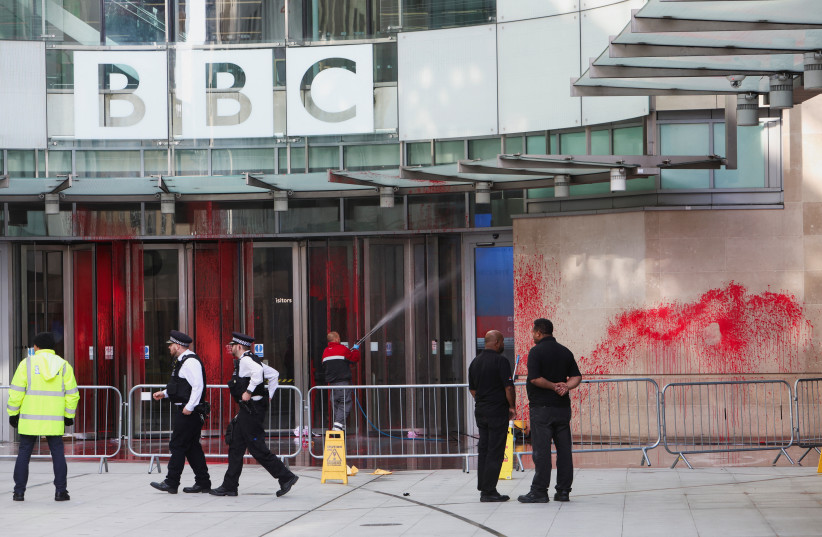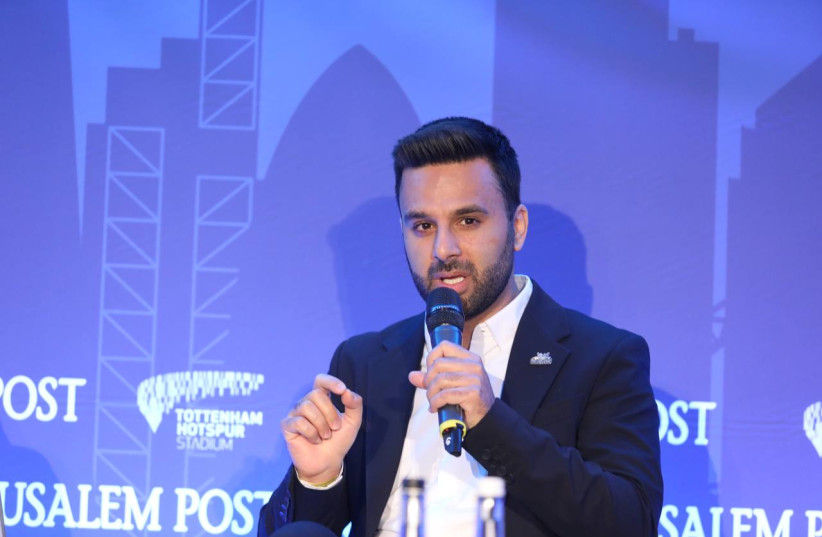Failing to provide full disclosures, purposefully misusing names of Israeli governmental functions or locations, lauding the October 7 massacre and other terror attacks, general lack of impartiality, and constant interruptions are only some of the issues Israeli guests and experts describe they face when invited to speak at BBC Arabic, the Arabic-language version of the British state-owned news network.
BBC Arabic has been under scrutiny for the past several weeks. Earlier this week, the Telegraph published an exposé revealing that BBC journalists who were being investigated for expressing support for Hamas’s October 7 massacre – returned to cover the war once again.
Additionally, last week, Sir Michael Ellis, former attorney-general for England and Wales, warned in Parliament about the harmful effect of the BBC’s coverage of the war, blaming the outlet of “failing the British public” and accusing the network of flaming the rise in antisemitism in the UK.
Media Bias and Controversy
One of the main protagonists of these trends is anchor Noureddine Zorgui, who insinuated that Jewish students in the UK were instructed by Israel to “pursue a campaign of censorship,” said he was broadcasting “from Palestine” while visiting Nazareth, and defended the comparison between Palestinian criminals serving time in Israeli prisons and Israeli children and elderly taken hostage by Hamas.

Yet a short survey of Arabic-speaking Israeli interviewees brought to speak on the channel, Jews and Arabs alike, shows that it’s not one specific anchor but rather a recurring phenomenon.
A BBC spokesperson said, “As we said at the time, we take allegations of breaches of our social media guidance very seriously and we took urgent action to investigate each case in detail. We do not comment on individual staff matters, however, if we find breaches we take the appropriate action.”
In another instance, regarding the designation of Hamas as a terrorist organization, the BBC commented: “The BBC, along with many other UK and global news organizations, does use the word ‘terrorist,’ but attributes it. We have made clear to our audiences that Hamas is proscribed as a terrorist organization by the UK and other governments. The use of attribution is required by our Editorial Guidelines.”
Yoseph Haddad facing challenges to Media Integrity
Yoseph Haddad, a well-known Arab Israeli face across the globe, tells of an inherent anti-Israel bias at the station.
“They fail to comply with journalistic standards; their coverage is unbalanced. One of the anchors stopped me in mid-sentence while I was talking about the issue of sexual violence and rape and scolded me, arguing that there was no evidence.

“In another instance, I talked about the viral videos of Gazans complaining that Hamas is hiding among them and using them as human shields, and the anchor outright denied the existence of these videos. Their questions are pre-formulated against me specifically or against Israel – they rarely want to expose the truth; rather they seek to tackle me personally. And of course, they don’t refer to Hamas as a terrorist organization, which is true for their English-speaking channels as well.”
Idit Bar's experience
Idit Bar, a researcher and lecturer for the Arab world and Arabic language, also faced unpleasant events while being interviewed on BBC Arabic. Bar tells The Jerusalem Post that she is well aware that whenever she’s invited to speak, all other panelists receive much more airtime than she does. “Sometimes the anchors themselves take the liberty to respond to my comments to other panelists, instead of acting somehow neutral and allowing the others to respond,” she adds.
Bar also talks about one time when she was stopped by the anchor altogether after referring to the issue of sexual violence and rape by the sadistic Hamas fundamentalists, being told that she “did not comply with the BBC’s standards.” Bar also says “I still go up there and try my best to give them a fight, regardless of the poor treatment I get. We need to be there, as the Arabic-speaking arena is usually left behind.”
Idan Ronen's experience
Idan Ronen, an Israel advocate who appeared several times on BBC in Arabic, expresses even more anger.
“The last thing they’re interested in is listening to Israeli guests. Sometimes the facilitators add their personal opinion as if it were a fact, or as part of the formulation of their question. At other times, when I finished a comment, they added a personal comment against me without even allowing me to respond and immediately moved on to the next question.
“When I push back, they do everything to prevent me from completing my point, either by repeated interruptions or by changing to another subject. For example, I showed one moderator a screenshot showing a Palestinian flag waving next to the Nazi flag and added that some Palestinians sympathize with the Nazis. The moderator immediately interrupted me and changed the subject: ‘And what about the siege? And what about the attacks on al-Aqsa Mosque?’
“In another interview, when I accused the BBC of showing only a partial picture, the moderator interrupted me by saying, ‘Mr. Idan, don’t blame the BBC. We are not a party to this conflict,’ and, as he was saying that, an image of a waving Palestinian flag was displayed across the entire wall behind the presenter’s head,” he adds.
Anonymous BBC Arabic interviewee's experience
Another interviewee who chose to remain anonymous adds that, while he appreciates the platform offered by BBC, he also identifies a certain lack of impartiality, adding that lately he was interrupted several times by hosts, in addition to the usage of skewed or twisted terms such as “Israeli genocide,” “arbitrary executions,” or “prisoners of war,” which sometimes amount to emulating Hamas propaganda.
The source added that he believes that public Western channels that have decided to open Arabic-language outlets should become more involved in monitoring and supervising what is said on their behalf and at their taxpayers’ expense, as impartiality is “not an option but rather the basis of professional and responsible journalism.”
CAMERA's response to the matter
A spokesperson from the CAMERA media watchdog group added that “part of the problem is the double standard.” “The same presenters who would confront Israeli and American speakers with the falsehood that Hamas did not kill civilians until February 1994 or the false claim that its antisemitic 1988 charter is no longer in effect, suddenly go silent when Palestinian propagandists (labeled as ‘experts’) tell them confidently that Hamas only attacked military targets on 7/10. Other BBC Arabic programs uncritically platform voices accusing Israel of controlling the international media and carrying out a ‘Holocaust’ against the Palestinians for 75 years.”
The spokesperson also mentioned that the corporation’s complaint system came under scrutiny several times, with a late January Telegraph piece exposing the failure of the BBC to investigate anti-Israel bias. Additionally, in November 2022, the BBC itself referred to the way complaints about its Arabic output were handled as “unacceptable,” publicly apologizing on the pages of the Jewish Chronicle.
“In the end, this is an issue of accountability,” adds Hadar Sela, CAMERA’s BBC expert, pointing out that the BBC – its Arabic service included – is funded by the license fee payers of the United Kingdom. “The lack of adequate oversight of BBC Arabic’s output – especially in a language that most British people and their elected officials do not understand – is ultimately an own goal for the BBC.”
The BBC responds
In response to allegations that BBC Arabic treats its Israeli guests unfairly, the BBC wrote to the Post, quoting a spokesperson for the British news organization.
“BBC News Arabic invites a range of contributors on our programmes as we are committed to hearing from a broad spectrum of voices and perspectives," the spokesperson wrote. "Our journalists routinely question and challenge the views of contributors, as our audiences would expect. As with all our services, BBC News Arabic is committed to achieving due impartiality across its output.”
